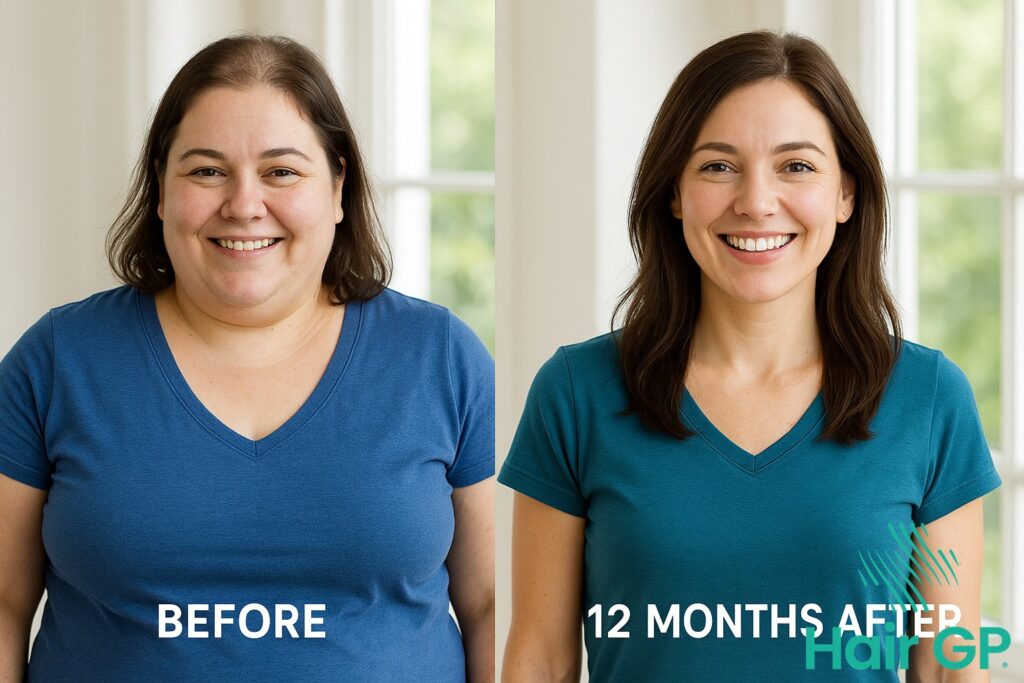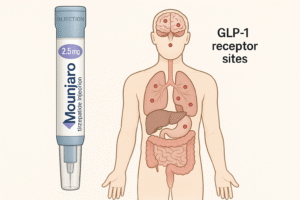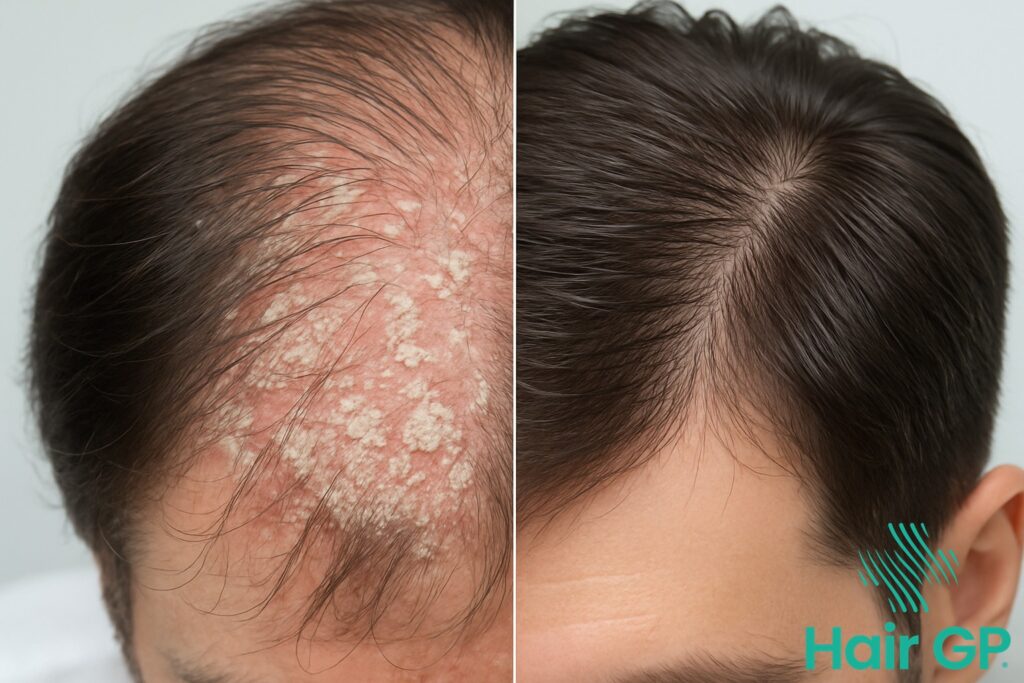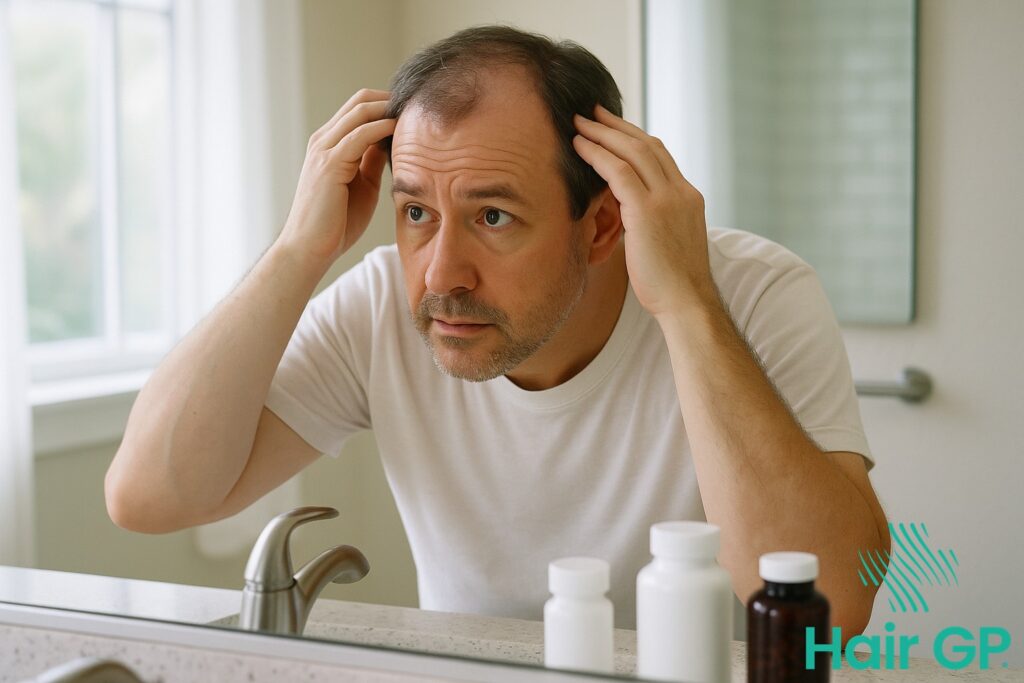Introduction
Experiencing hair loss after bariatric surgery can be distressing, but understanding this common side effect helps ease concerns and prepare for the journey ahead. Whilst the physical transformation following weight loss surgery brings tremendous health benefits, many patients are surprised to discover increased hair shedding in the months following their procedure.
This temporary hair loss, medically known as telogen effluvium, affects approximately 30-40% of bariatric surgery patients. The rapid weight loss and significant metabolic changes your body undergoes after surgery can shift hair follicles into a resting phase, leading to noticeable shedding typically beginning three to four months post-procedure. The good news is that for most patients, this condition is entirely reversible, with hair regrowth occurring naturally within six to twelve months.
Understanding why this happens and knowing what to expect can significantly reduce anxiety during recovery. This comprehensive guide explores the science behind post-surgical hair loss, providing a detailed timeline of when shedding typically occurs and when regrowth begins. We’ll examine how different surgical procedures may influence hair loss patterns and identify the crucial nutrients needed to support healthy hair during weight loss.
You’ll discover practical strategies to minimise hair loss severity, from pre-surgical preparation to post-operative care routines. We’ll also review available treatment options and guide you on working effectively with your healthcare team. Armed with this knowledge, you can approach hair loss after bariatric surgery with confidence, knowing it’s a temporary phase in your transformative health journey.
Key Takeaways – TL/DR
- Hair loss after bariatric surgery typically begins 3-6 months post-operation and affects up to 41% of patients
- The condition, known as telogen effluvium, is temporary and hair usually regrows within 6-12 months
- Proper nutrition, especially protein and vitamin supplementation, can minimize hair loss severity
- Most patients experience complete hair regrowth with no permanent damage to follicles
Why Does Hair Loss Happen After Bariatric Surgery?
Understanding why hair loss happens after metabolic and bariatric surgery requires examining the complex relationship between rapid weight loss and the hair growth cycle. The primary culprit behind post-surgical hair shedding is telogen effluvium, a condition where significant physical stress causes hair follicles to prematurely enter the resting phase of their growth cycle[1].
Under normal circumstances, approximately 10-15% of hair follicles are in the telogen phase at any given time. However, the metabolic stress from bariatric surgery and subsequent rapid weight loss can push up to 30% of follicles into this resting state simultaneously[2]. This synchronised shift typically occurs 3-4 months after surgery, when affected hairs begin falling out as new growth emerges beneath them.
The dramatic metabolic changes following surgery play a crucial role in triggering telogen effluvium. As the body rapidly loses weight, it prioritises essential functions over hair growth, temporarily redirecting nutrients and energy away from hair follicles. This protective mechanism ensures vital organs receive adequate nutrition during the adjustment period, but leaves hair growth as a lower priority.
Nutritional factors significantly influence post-surgical hair health. Reduced caloric intake, altered nutrient absorption, and potential deficiencies in protein, iron, zinc, and B vitamins can exacerbate hair shedding. The small stomach pouch created during surgery limits food intake, whilst anatomical changes may affect how efficiently the body absorbs certain nutrients, particularly in procedures like gastric bypass.
Reassuringly, this hair loss is temporary and self-limiting. As the body adapts to its new metabolic state and nutritional status stabilises, usually within 6-12 months post-surgery, hair follicles resume their normal growth cycle. Most patients report complete hair regrowth, often with improved texture and thickness once optimal nutrition is restored.
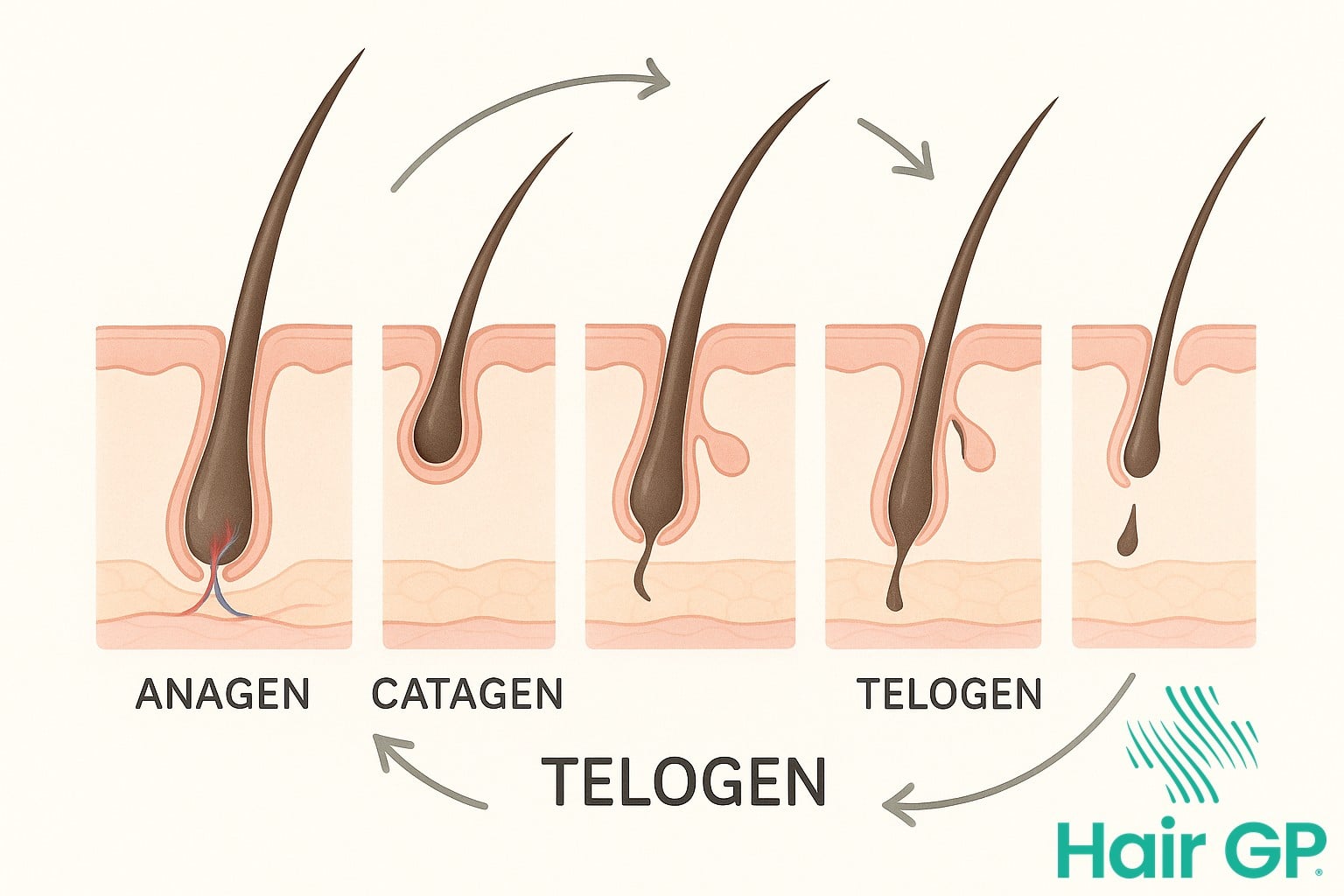
Timeline: When to Expect Hair Loss Post-Surgery
Understanding the timeline of hair loss post surgery helps patients prepare mentally and practically for this temporary phase. Most patients experience hair loss between three to six months after their bariatric procedure, with complete hair regrowth typically occurring within twelve months.
Months 1-3: Initial Recovery Phase
During the immediate postoperative period, hair typically remains unaffected as your body focuses on healing from surgery. This phase prioritises recovery, with most patients maintaining their normal hair density. Whilst uncommon, some individuals may notice subtle thinning towards the end of this period. Your primary focus should be meeting nutritional requirements and following your surgical team’s recovery guidelines, as proper nutrition during this time can influence future hair health.
Months 3-6: Peak Hair Loss Period
This timeframe marks when most patients experience hair loss, with hair shedding becoming noticeably more pronounced. Studies indicate that bariatric patients can lose between 30-40% of their hair volume during this peak period[1]. The hair loss typically presents as diffuse thinning across the entire scalp rather than localised patches. Many patients find this phase emotionally challenging, but understanding that it’s temporary and part of the body’s response to rapid weight loss provides reassurance.
Months 6-12: Recovery and Regrowth
Hair regrowth typically begins around month six, with new hair becoming visible as small, fine strands emerging from the scalp. By month twelve, most patients see complete recovery of their hair density. During this regrowth phase, hair texture may temporarily differ from pre-surgery hair, appearing finer or slightly different in texture before returning to its normal state.
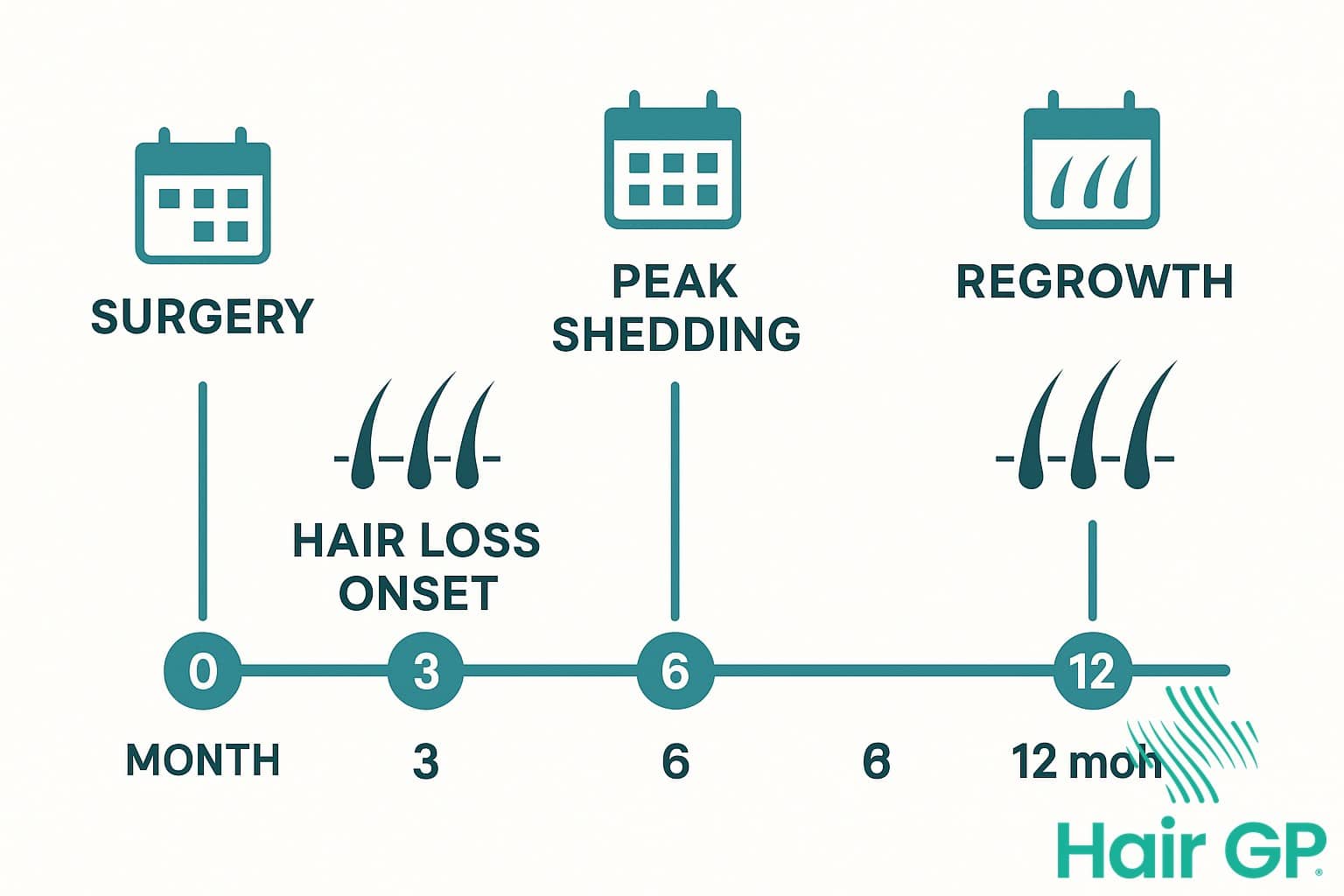
Hair Loss Risk by Procedure Type
Different bariatric procedures carry varying risks of post-operative hair loss, with the extent largely determined by each surgery’s impact on nutrient absorption. Studies comparing gastric bypass and sleeve gastrectomy procedures reveal distinct patterns in hair loss occurrence and severity [3]. Understanding these differences helps patients and healthcare teams implement appropriate preventive strategies tailored to specific surgical approaches.
Gastric Bypass and Hair Loss
Gastric bypass surgery typically presents a higher risk of hair loss compared to other bariatric procedures, with approximately 35-40% of patients experiencing significant hair thinning [3]. The procedure’s extensive rerouting of the digestive system creates greater malabsorption challenges, particularly affecting iron, zinc, and protein absorption. Patients undergoing gastric bypass often require more aggressive supplementation protocols, including higher doses of vitamins and minerals. The timeline for hair loss following gastric bypass surgery mirrors other procedures, typically beginning three to six months post-operation, though the severity may be more pronounced without proper nutritional support.
Sleeve Gastrectomy Impact
Sleeve gastrectomy, including laparoscopic sleeve gastrectomy, generally demonstrates lower hair loss rates compared to gastric bypass, affecting approximately 20-30% of patients [4]. This procedure preserves the normal digestive pathway, maintaining better nutrient absorption whilst still achieving significant weight loss. Despite the reduced risk, patients still require careful monitoring and supplementation, particularly for protein, iron, and B vitamins. The less invasive nature of sleeve procedures typically results in milder hair loss episodes that respond well to standard nutritional interventions.
Essential Nutrients to Prevent Hair Loss
Maintaining optimal nutrition after bariatric surgery is crucial for preventing hair loss and supporting healthy hair growth. Understanding specific nutritional requirements helps patients develop targeted supplementation strategies that address the unique challenges of post-surgical nutrient absorption and utilisation.
Protein Requirements for Hair Growth
Hair follicles require adequate protein to produce keratin, the primary structural component of hair strands. Bariatric patients should aim for 60-80 grams of high-quality protein daily to support both general recovery and hair health [5]. Achieving this target requires strategic meal planning, as the reduced stomach capacity limits portion sizes. Complete protein sources such as lean poultry, fish, eggs, and Greek yoghurt provide essential amino acids necessary for robust hair growth. Timing protein intake throughout the day, rather than consuming large amounts at once, optimises absorption and utilisation. Many patients find success by incorporating protein supplements between meals, ensuring consistent amino acid availability for follicular function.
Critical Vitamins and Minerals
Micronutrient deficiencies significantly contribute to post-surgical hair loss, with studies showing up to 50% of bariatric patients experiencing vitamin deficiencies within the first year [6]. Iron deficiency particularly affects hair health, as ferritin stores are essential for follicular development. Zinc supports protein synthesis and cellular repair, whilst biotin aids in keratin production, preventing brittle hair and breakage. B-complex vitamins, including folic acid, facilitate cellular metabolism and red blood cell formation, directly impacting nutrient delivery to hair follicles. Specialised bariatric vitamins formulated with enhanced bioavailability address absorption challenges unique to post-surgical anatomy. Patients should follow structured supplementation schedules, taking iron separately from calcium-containing supplements to maximise absorption. Regular monitoring of vitamin levels allows for personalised adjustments, ensuring optimal nutrient status to support healthy hair growth throughout the weight loss journey.
Strategies to Minimize Hair Loss
Whilst hair thinning after bariatric surgery is common, implementing preventive strategies can significantly minimize hair loss and reduce its severity. Taking proactive steps both before and after surgery helps bariatric patients maintain healthier hair throughout their weight loss journey.
Pre-surgery preparation plays a crucial role in reducing future hair loss. Starting a comprehensive vitamin regimen several weeks before undergoing bariatric surgery allows the body to build nutritional reserves. Focus on biotin, iron, zinc, and protein supplements as recommended by your surgical team. Additionally, ensuring adequate protein intake and addressing any existing nutritional deficiencies through blood tests creates a stronger foundation for post-surgery recovery.
After surgery, establishing consistent care routines becomes essential to minimize hair loss. Taking prescribed supplements religiously, even when feeling well, prevents nutritional gaps that trigger hair thinning. Meeting daily protein targets through appropriate food choices or supplements supports hair follicle health. Gentle hair care practices, including using mild shampoos, avoiding excessive heat styling, and minimising chemical treatments, protect existing hair from additional stress.
Lifestyle modifications further support hair retention for bariatric patients. Managing stress through relaxation techniques, meditation, or gentle exercise helps reduce hair loss triggered by cortisol. Staying well-hydrated supports overall health and hair growth. Regular follow-ups with your healthcare team ensure nutritional needs are met as your body adapts. Patience remains important—understanding that some hair loss is temporary helps reduce anxiety, which can worsen hair thinning. By combining these strategies, patients can effectively reduce hair loss severity whilst their bodies adjust to significant weight loss.
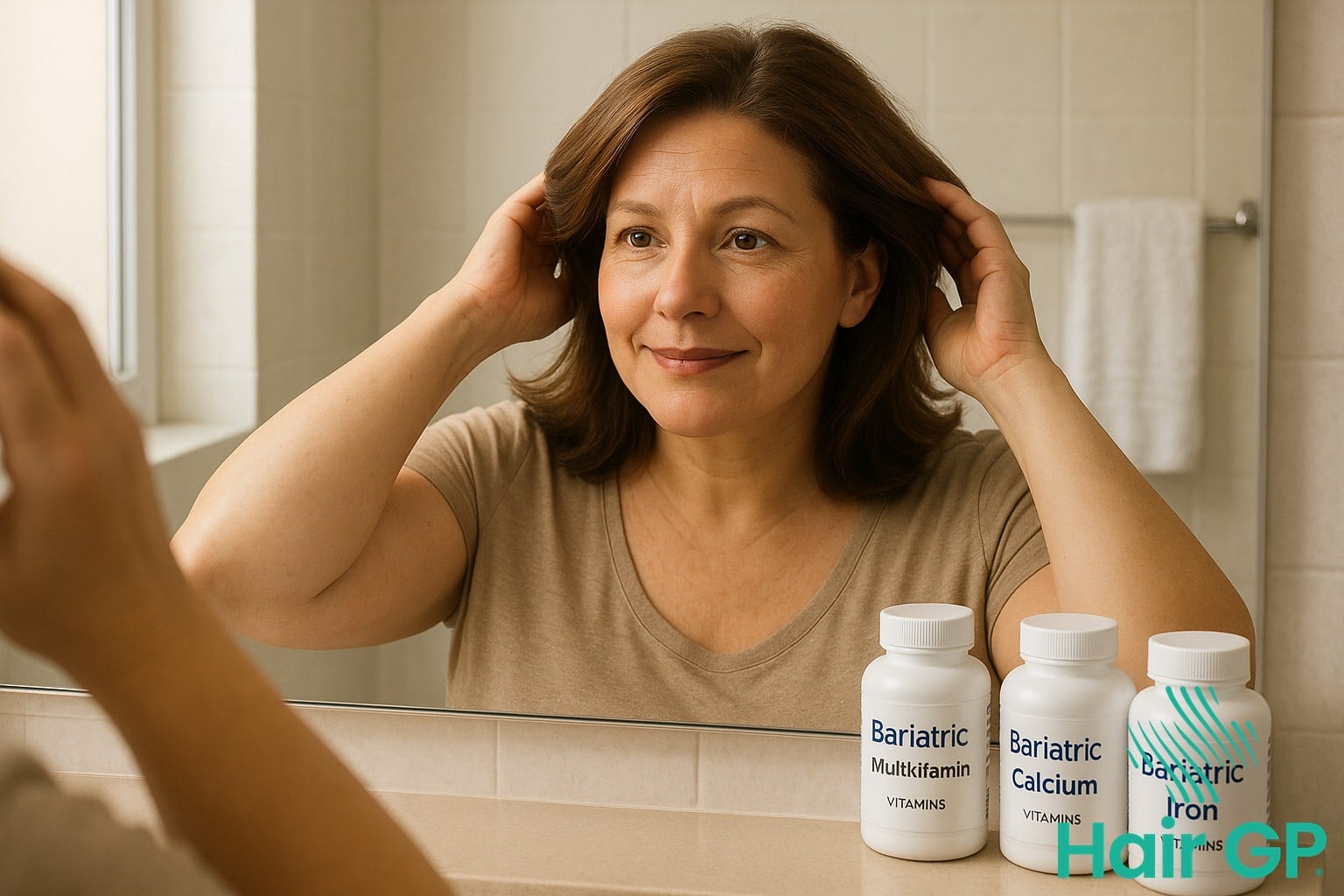
Treatment Options for Hair Loss
When bariatric patients experience hair loss, several evidence-based treatment options can help minimise thinning hair and promote healthy hair regrowth. The approach typically combines nutritional optimisation with targeted therapies to address both the underlying causes and visible symptoms.
Minoxidil remains the most extensively studied topical treatment for telogen effluvium-related hair loss. Research demonstrates that 2% minoxidil solution applied twice daily can effectively shorten the telogen phase and stimulate hair growth, with visible improvements typically observed within 12-16 weeks [7]. Whilst originally developed for androgenetic alopecia, minoxidil has shown promising results in post-surgical telogen effluvium cases, helping patients achieve more hair density during the recovery period.
Nutritional intervention forms the cornerstone of treatment, focusing on correcting identified deficiencies through targeted supplementation. Iron replacement therapy, when indicated by laboratory results, can significantly improve hair regrowth outcomes. Protein supplementation, aiming for 60-80 grams daily, provides essential amino acids necessary for keratin production. Biotin supplements, though widely recommended, show variable effectiveness and work best when addressing documented deficiencies [8].
Professional treatments include low-level laser therapy and platelet-rich plasma injections, though evidence specific to bariatric-related hair loss remains limited. Hair Specialist Doctor consultation may be warranted for patients experiencing persistent or severe hair loss beyond six months post-surgery. Most importantly, patients should understand that hair regrowth typically occurs naturally as nutritional status improves and the body adapts to its new metabolic state, with complete recovery expected within 12-18 months for most individuals.
Working with Your Healthcare Team
Open communication with your bariatric surgeon throughout your weight loss journey is essential, particularly when experiencing hair loss concerns. As obese patients lose weight following major surgery, various physiological changes occur that may require professional monitoring. Inform your surgical team about significant hair thinning during routine follow-ups, as they can assess whether your experience falls within normal parameters for post-surgical recovery.
Seeking specialist care becomes necessary when hair loss persists beyond six months or appears excessive. Your bariatric surgeon can provide referrals to specialised hair doctors who understand the unique challenges faced by weight loss surgery patients. These specialists may recommend blood tests to evaluate nutritional markers, including ferritin, zinc, vitamin D, and thyroid hormone levels.
During consultations, provide detailed information about your supplement regimen, dietary intake, and timeline of hair loss symptoms. Document your concerns with photographs to help healthcare providers assess progression. Remember that your medical team supports your overall wellness beyond helping you lose weight—they’re invested in addressing complications that impact your quality of life. Don’t hesitate to schedule appointments between regular check-ups if hair loss significantly affects your wellbeing or self-confidence.
Conclusion
Hair loss after bariatric surgery can be a concerning experience, but it’s important to remember that this condition is almost always temporary. The stress of significant weight loss and metabolic changes triggers telogen effluvium, causing increased shedding typically three to six months post-surgery. However, with proper care and patience, hair regrowth naturally occurs as your body adjusts to its new nutritional state.
The key to minimising temporary hair loss lies in maintaining adequate protein intake, supplementing essential vitamins and minerals, and following your surgical team’s nutritional guidelines. Regular monitoring of nutrient levels and consistent supplementation helps ensure your hair follicles receive the nourishment they need whilst your body undergoes transformation.
Remember that experiencing some hair shedding doesn’t diminish the incredible achievement of your weight loss journey. As your body stabilises and hair grows back—often healthier and stronger than before—you’ll have both improved overall health and restored confidence. Stay committed to your nutritional programme, be patient with the recovery process, and trust that this temporary phase will pass. Your dedication to bariatric surgery represents a profound investment in your long-term health and wellbeing.
Frequently Asked Questions
No, hair loss after bariatric surgery is typically temporary. Most patients experience telogen effluvium, which resolves within 6-12 months as the body adjusts to weight loss and nutritional status improves.
Hair loss usually begins 3-6 months after bariatric surgery, coinciding with rapid weight loss. Some patients may notice thinning as early as 2 months or as late as 6 months post-operation.
While you may not prevent it entirely, you can minimize severity by maintaining adequate protein intake (60-80g daily), taking prescribed bariatric vitamins, and following your surgeon’s nutritional guidelines.
Sleeve gastrectomy typically has slightly lower hair loss rates compared to gastric bypass due to less malabsorption, but all bariatric procedures can cause temporary hair loss due to rapid weight loss.
Minoxidil can help stimulate regrowth, but consult your bariatric team first. Since the hair loss is usually temporary, many patients recover without treatment by focusing on nutrition and patience.
References
- Asghar MS, Pratt R, George AM. Hair Loss After Metabolic and Bariatric Surgery: a Systematic Review and Meta-analysis. Obes Surg. 2020;30(6):2199-2207.
- Garg A. Hair Loss After Bariatric Surgery: A Comprehensive Review. Aesthet Surg J. 2019;39(11):1177-1184.
- Ruiz-Tovar J, Oller I, Llavero C, et al. Hair Loss After Sleeve Gastrectomy and Effect of Biotin Supplements. Surg Obes Relat Dis. 2020;16(5):626-631.
- Gillon S, Jeanes YM, Andersen JR, Våge V. Micronutrient Status in Morbidly Obese Patients Prior to Laparoscopic Sleeve Gastrectomy and Micronutrient Changes 5 years Post-surgery. Obes Surg. 2017;27(3):606-612.
- Mechanick JI, Apovian C, Brethauer S, et al. Clinical Practice Guidelines for the Perioperative Nutrition, Metabolic, and Nonsurgical Support of Patients Undergoing Bariatric Procedures – 2019 Update. Endocr Pract. 2019;25(12):1346-1359.
- Parrott J, Frank L, Rabena R, et al. American Society for Metabolic and Bariatric Surgery Integrated Health Nutritional Guidelines for the Surgical Weight Loss Patient 2016 Update: Micronutrients. Surg Obes Relat Dis. 2017;13(5):727-741.
- Messenger AG, Rundegren J. Minoxidil: mechanisms of action on hair growth. Br J Dermatol. 2004;150(2):186-194.
- Almohanna HM, Ahmed AA, Tsatalis JP, Tosti A. The Role of Vitamins and Minerals in Hair Loss: A Review. Dermatol Ther (Heidelb). 2019;9(1):51-70.

